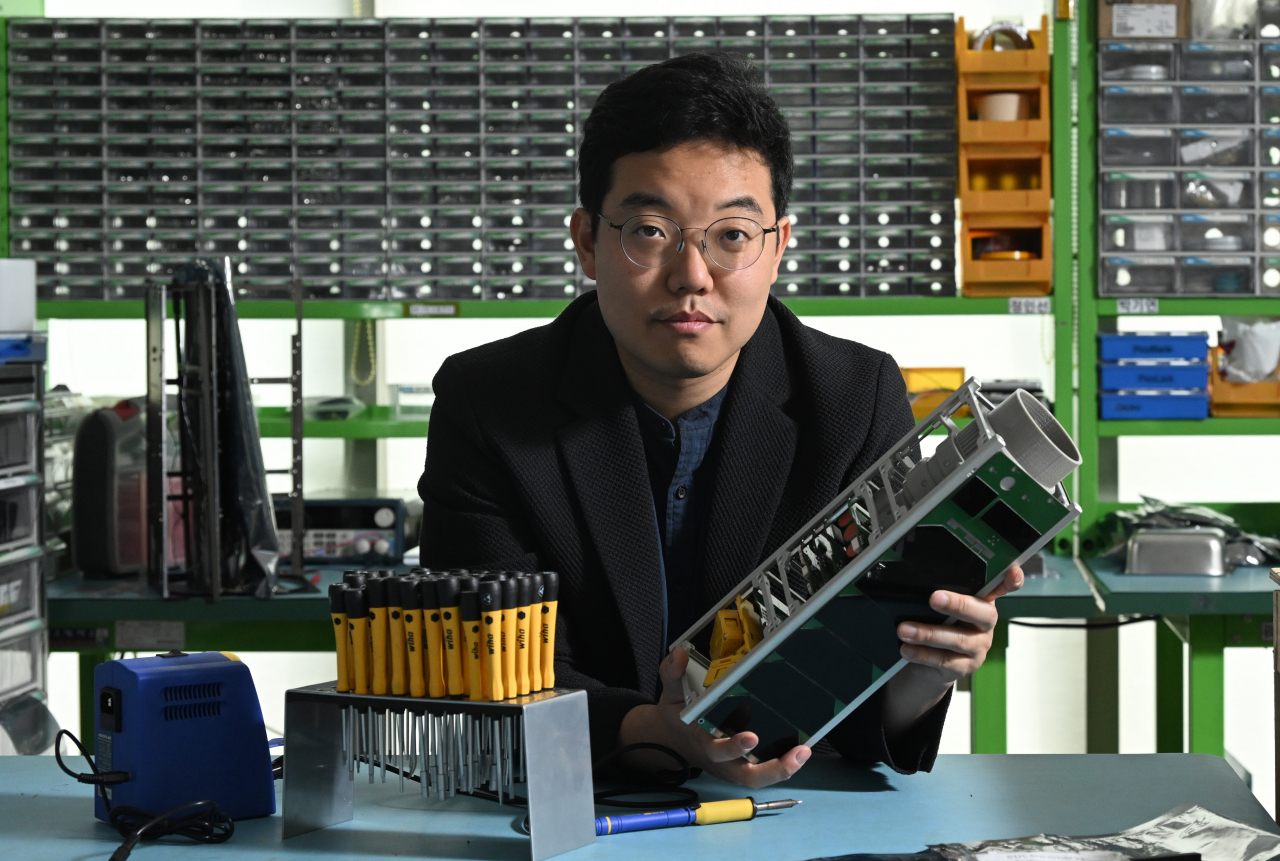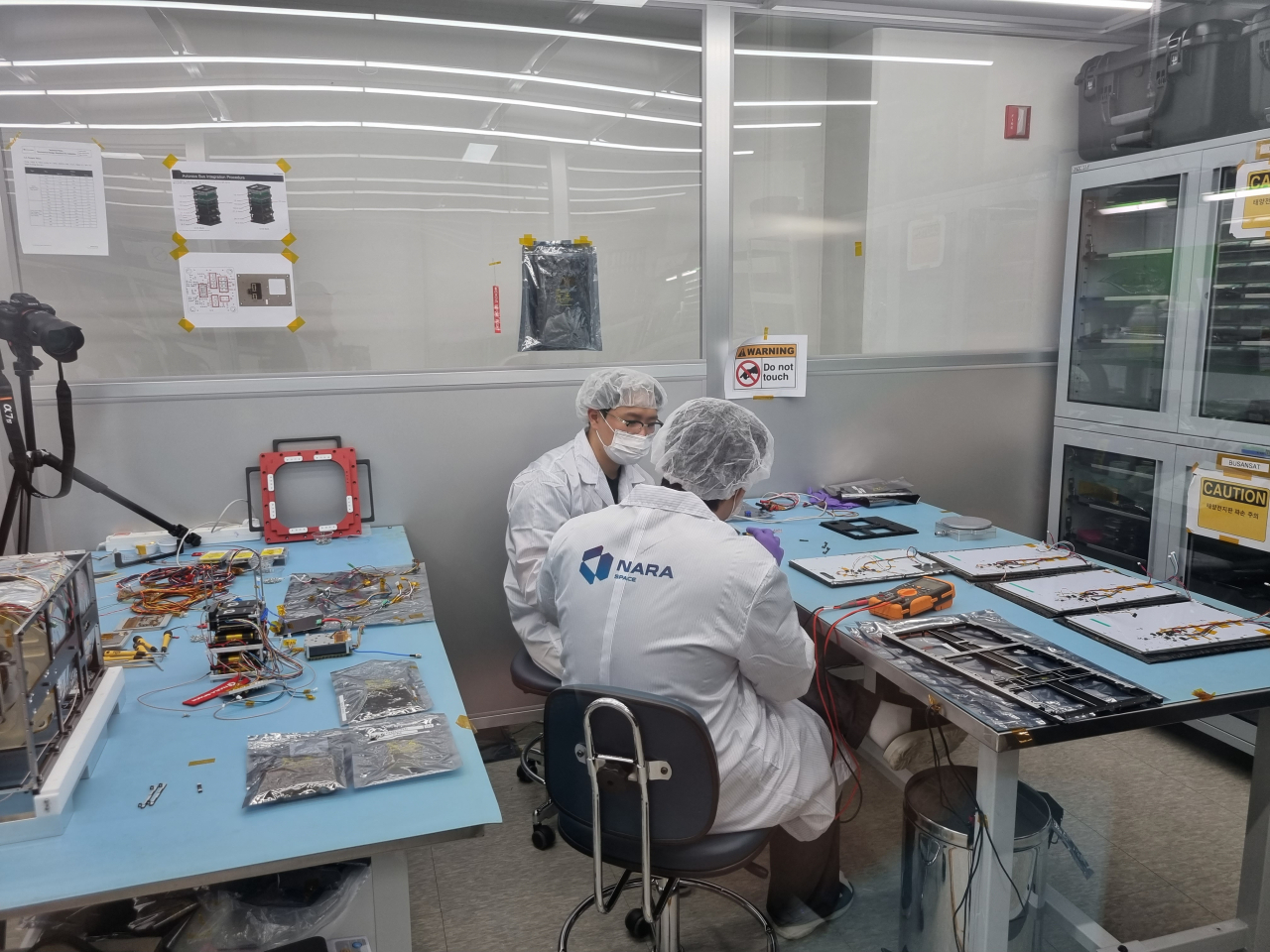[Beyond Earth] ‘Space traffic control will be huge market’
Nara Space looking to become S. Korea’s first system integration company to put small satellite into orbit
By Kan Hyeong-wooPublished : May 8, 2023 - 08:57

As the global space race gets heated, more satellites will be launched into space. Dealing with the increasing number of satellites will be an enormous market.
Nara Space, a South Korean startup specializing in developing small satellites and providing solutions with satellite images of the Earth, is aiming to become a pioneer in the space traffic control sector.
“We think the market for controlling space traffic or markets related to space traffic will grow immensely,” Park Jae-pil, CEO of Nara Space, told The Korea Herald in an interview held at the space startup’s office in Seoul on May 2.
“Eventually, the time will come for the satellites that can fuel other satellites, clean up space garbage and even take down hostile satellites when needed,” he said.
According to a report by Fortune Business Insights, the global small satellite market is projected to grow to $12 billion in 2029 from $5.6 billion in 2022, with a compound annual growth rate of 11.5 percent.
As part of the government’s space projects, Nara Space has been working on the research and development of removing space garbage. Park noted the startup’s technology of operating satellites in close proximity to other satellites as a foundational technology that can be used in various areas.
Nara Space will look to become Korea’s first system integration company to put a nano satellite, which is developed with its technology and assembled by its personnel, into orbit in October. Named Observer-1A, the satellite will be loaded onto SpaceX’s launch vehicle Falcon 9 for space travel. The Observer-1A weighs 25 kilograms and is the size of a microwave.
“The satellite has a resolution of 1.5 meters. With our super-resolution technology, the satellite imagery service can be offered in a resolution of 0.5 meters. In that case, we will be able to provide global-level services by having the highest resolution given the size (of the satellite),” said Park.
The mission of the Observer-1A is to test the satellite’s image-taking capability and check whether it can capture certain places according to the planned schedule. The satellite will be able to take one image per orbit, which means that it will produce a satellite image every 90 minutes. The duration of the mission is expected to last between two and three years, according to the CEO.

Nara Space has received the highest level of technical-readiness certification from the US National Aeronautics and Space Administration for its onboard computer, also known as OBC, technology. The startup’s OBC, which works as the brain of a satellite to control various operations, was able to capture the ejection moments of the four cube satellites launched into orbit on Korea’s homegrown Nuri rocket in June last year.
The CEO underscored that the company’s goal is to be operating 100 satellites five years from now with a well-established system of mass production, noting that having such an amount of satellites in space will allow Nara Space to provide real-time information about major cities across the world through satellite imagery.
“The goal is to be able to assemble one small satellite with five people. We are working on optimizing the internal blueprint to cut down the time consumption while also trying to make the satellite assembly process resemble the manufacturing of a computer,” said Park.
The 35-year-old CEO established Nara Space in 2015. The startup raised 10 billion won ($7.6 million) in series A funding in May 2022.
Another core business of Nara Space is Earthpaper, a satellite data analysis platform. Park explained that Earthpaper is like Google and Coupang in the way that it allows users to search for satellite images and buy them with easier access.
“There are people who are not familiar with satellite images. For example, city managers, those in charge of disaster control or people working at financial companies might not know how to utilize satellite images. We offer them insight pages so that they can learn how to use satellite images for what they do,” he said.
According to the CEO, the number of Earthpaper users reached about 30,000 during the closed beta test period. He noted the company is close to launching its open beta test.
“Our goal is to provide satellite data to those who find it difficult to access them because we believe a society where satellite data can be used without our recognition will come,” said Park.








![[Graphic News] More Koreans say they plan long-distance trips this year](http://res.heraldm.com/phpwas/restmb_idxmake.php?idx=644&simg=/content/image/2024/04/17/20240417050828_0.gif&u=)
![[KH Explains] Hyundai's full hybrid edge to pay off amid slow transition to pure EVs](http://res.heraldm.com/phpwas/restmb_idxmake.php?idx=644&simg=/content/image/2024/04/18/20240418050645_0.jpg&u=20240419100350)






![[From the Scene] Monks, Buddhists hail return of remains of Buddhas](http://res.heraldm.com/phpwas/restmb_idxmake.php?idx=652&simg=/content/image/2024/04/19/20240419050617_0.jpg&u=20240419175937)

![[KH Explains] Hyundai's full hybrid edge to pay off amid slow transition to pure EVs](http://res.heraldm.com/phpwas/restmb_idxmake.php?idx=652&simg=/content/image/2024/04/18/20240418050645_0.jpg&u=20240419100350)

![[Today’s K-pop] Illit drops debut single remix](http://res.heraldm.com/phpwas/restmb_idxmake.php?idx=642&simg=/content/image/2024/04/19/20240419050612_0.jpg&u=)